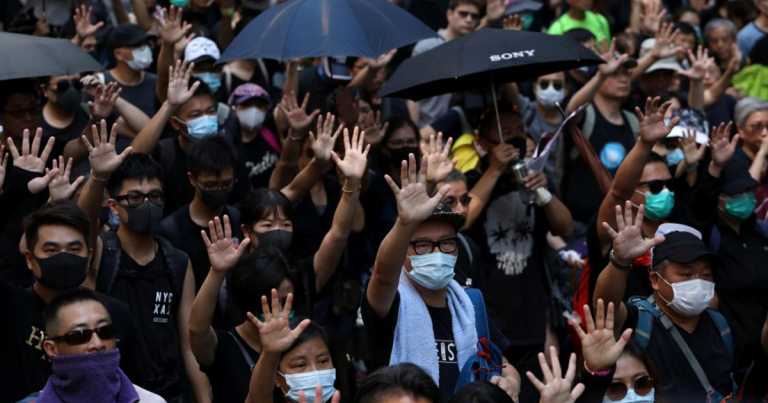
(Reuters): Police fired tear gas as thousands of anti-government protesters fanned out across Hong Kong on Tuesday, posing a direct challenge to Chinese President Xi Jinping as he celebrated the 70th anniversary of the founding of the People’s Republic.
The Chinese territory has been on edge for weeks, with authorities scrambling to avoid protesters spoiling Beijing’s birthday parade at a time when the central government is already grappling with a U.S.-China trade war and a slowing economy.
Peaceful protests descended into chaos with police firing volleys of tear gas outside a famous Taoist temple in the residential district of Wong Tai Sin and the New Territories area of Sha Tin.
Nearly four months of street clashes and demonstrations have plunged the former British colony into its biggest political crisis in decades and pose the gravest popular challenge to President Xi since he came to power.
Thousands of black-clad protesters, some wearing Guy Fawkes masks, marched from Causeway Bay toward government headquarters in Admiralty, defying a ban on a rally and setting up the likelihood of clashes with police.
Protesters had vowed to seize the opportunity on Tuesday to propel their calls for greater democracy onto the international stage, hijacking an occasion Beijing sees as an opportunity to showcase China’s economic and military progress.
Demonstrators blocked roads across the territory in frantic game of cat-and-mouse with police, piling pressure on already stretched security resources.
“I’m not young, but if we don’t march now, we’ll never have the chance to speak to again, it’s as simple as that,” said one marcher near Causeway Bay, a 42-year-old woman with her own logistics company who identified herself as Li.
Police said on Monday they expected a “very serious violent attack” in the city but gave no details.
On Tuesday, they said they arrested five people, aged between 17 and 25, in the central district of Wan Chai late on Monday after finding them with walkie-talkies, lighters and material for petrol bombs, including 18 liters (4.75 gallons) of fuel and empty bottles.
Hundreds of officials and members of the pro-establishment elite began the day with a flag-raising ceremony and National Day reception at the Convention and Exhibition Centre, held early and moved behind closed doors. Roads to the center were closed and tightly policed.
Hong Kong has benefited from China’s support under the “one country, two systems” policy, Acting Chief Executive Matthew Cheung told the assembly, referring to guarantees of political freedoms after the city’s handover from British to Chinese rule in 1997.
However, he said escalating violence was disrupting social order and hurting the economy.
NUMBERS DOWN
The IFC mall, one of the city’s largest upscale shopping centers, was closed on Tuesday, depriving retailers of sales in what would normally be a busy shopping week when mainland tour groups traditionally flood in for the annual Golden Week holiday.
IFC houses an Apple Inc store, jewelers Tiffany & Co and Chow Sang Sang, cosmetics maker L’Occitane and Gucci, which is owned by French group Kering.
Standard & Poor’s cut its Hong Kong economic growth forecast on Tuesday to a paltry 0.2 percent for this year and 1.6 percent for 2020, blaming tension in the city for the plunging retail sales and a sharp dip in tourism. Its last forecast in July was for 2.2 percent growth this year and 2.4 percent for 2020.
Visitor arrivals dropped 39% in August from a year earlier, with the number of mainland tourists to Hong Kong dropping 42.3% over the period, according to the latest data.
Cheung called a first “open dialogue” last week with citizens an important step and said more would follow.
A group of protesters outside the venue shouted “No national day celebrations, only national day mourning”, and called for those arrested during recent clashes to be released. Police fired pepper spray during a scuffle outside a nearby train station.
Rail operator MTR Corp closed some flash-point metro stations.
The government of embattled leader Carrie Lam has already canceled an annual Oct. 1 fireworks display over the city’s Victoria Harbour, citing public safety.
Lam, who was trapped in a stadium for hours last week after attending the “open dialogue”, left for Beijing on Monday to celebrate China’s birthday on the mainland. She will return on Tuesday.
BEIJING PARADES
In contrast to events in Hong Kong, Beijing’s carefully choreographed anniversary festivities included troops marching through part of Tiananmen Square with new missiles and floats celebrating the country’s technological prowess.
Lam was shown on television smiling as a float celebrating Hong Kong went past as she sat with Chinese officials.
The Communist Party leadership is determined to project an image of national strength and unity in the face of challenges including Hong Kong’s unrest, slowing economic growth and a trade war with the United States.
“On our journey forward, we must uphold the principles of peaceful reunification and one country, two systems; maintain lasting prosperity and stability in Hong Kong and Macau … and continue to strive for the motherland’s complete reunification,” Xi said in his nationally televised speech in Beijing.
Hong Kong protesters are angry about what they see as creeping Chinese interference in the Asian financial center.
China dismisses the accusation and has accused foreign governments, including the United States and Britain, of fanning anti-China sentiment.
Last month, Beijing moved thousands of troops across the border into the city. The Xinhua state news agency described the movement as routine rotation.
Asian and Western envoys in Hong Kong, however, have said the absence of any evidence that troops had been withdrawn suggested it was a reinforcement, with the largest-ever regular army force now stationed in the city.




